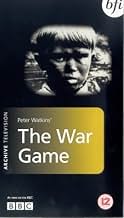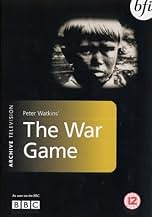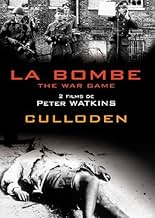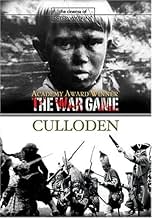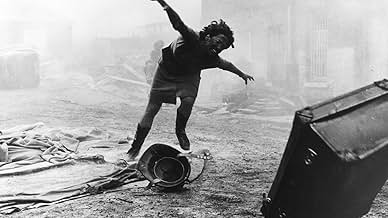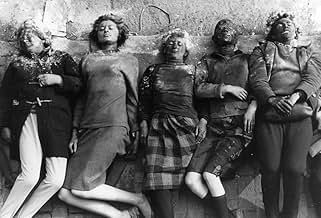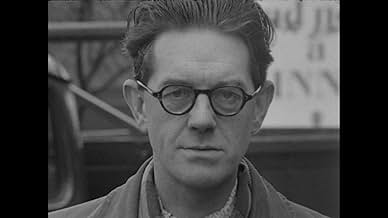NOTE IMDb
7,9/10
7,7 k
MA NOTE
Ajouter une intrigue dans votre langueA docudrama depicting a hypothetical nuclear attack on Britain.A docudrama depicting a hypothetical nuclear attack on Britain.A docudrama depicting a hypothetical nuclear attack on Britain.
- Récompensé par 1 Oscar
- 5 victoires au total
Dave Baldwin
- Schoolmaster
- (non crédité)
- …
Kathy Staff
- Interviewee
- (non crédité)
Peter Watkins
- Documentist
- (non crédité)
Avis à la une
The War Game is one of the most amazing films I have ever seen. It's a pseudo-documentary made in 1965, about the possible effects of a nuclear attack on Great Britain. The director's premise is that Britain (and indeed the world) is hopelessly unprepared for such a thing. Some classic scenes: befuddled Brits receiving civil defence booklets. Blank stares greeting the interviewer when he asks Brits on the street about radioactive fallout. The footage is all made to look horribly real. Some of it looks a little hokey - the use of a shaky camera to simulate a desperate ground battle stands out - but there are also very convincing scenes of firestorms raging out of control, sucking the oxygen out of the air for blocks around. Also, incredible scenes of radiation burn victims, food riots, police polishing off the near dead, etc... The killer part is at the end - an interview with some young blast victims will haunt you for a long time.
"Do you know what Strontium-90 is, and what it does to the human body???"
"Do you know what Strontium-90 is, and what it does to the human body???"
10Baroque
Although this film clocks in at a mere 48 minutes, not a scene, second or frame is put to waste. A level-headed and all too analytical examination of civil preparedness versus the yield of nuclear weapons. What this film presents is the absolute horror of nuclear war in simulated newsreel footage so realistic, you may feel the pain of those on screen. Fire-storms, asphyxiation, flash-burns, over-burdened hospitals leaving victims to die in pain, street executions under martial law, total social collapse, all filmed in a typical English suburb. Originally planned to be a simple documentary on nuclear warfare made for BBC-TV, the film was banned from television (officially because of it's graphic depictions of suffering, but most likely for it's anti-authoritarian stance and defiance of the official line). Later released to theaters, it went on to win major film awards. Two scenes in particular, one of men being executed for violating water rationing and an interview with children at a medical camp, haunted me for days. This is the great-grandfather of such films as "Threads" and "The Day After", but the matter-of-fact narration in BBC English to the devastation on screen adds an element of sheer horror that no other film comes close to. If anyone you know talks about the survivability of nuclear attack, show them this film, and watch their reaction. This film is too important to ignore, and too powerful to dismiss.
Just watched this for the first time, having heard and read much about it. It's still powerful stuff, and for 1966 this must have been particularly strong. The British Film Institute have just released this on DVD including an interesting documentary about the BBC's banning of the film, and a copy of Watkins' earlier film 'Diary of an unknown soldier'. Good stuff.
The War Game (1965) was a TV movie funded by the BBC. Peter Watkins gave them a movie that probably caused the hair on the necks of the BBC's standards and practices department to stand on end. Mr. Watkins paints a grim and bleak outlook for humanity if there ever was a nuclear conflict. Based on data from the hellish bombings of Dresden, Berlin, Tokyo, the atomic bombings of Hiroshima & Nagasaki and nuclear testing information from the U.S .Government (among his painstaking research and sources) shows the utter devastation that even a small exchange of missiles would bring upon his homeland. The acting is top notch (using a cast of unknowns) and the F/X were quite up to par (making the best out of the small budget). Even though the subject matter is dark and bitter, The War Game is a compelling watch and I highly recommended it for everyone.
'The War Game' is a fascinating and deeply disturbing documentary which dramatizes what might happen in the event of a nuclear strike. Of course in many ways it is dated but I still think its central message is as powerful and as frightening as ever. It was banned (either officially or non-officially, there is some debate) by the BBC for many years, and it's no wonder. The film is political dynamite. This is not a film you would choose to watch for entertainment, but I highly recommend it to anyone who is willing to look at something confrontational and REAL. The Cold War is long over but the threat of nuclear annihilation remains, and therefore 'The War Game' still deserves to be seen by a mass audience before it's too late.
Le saviez-vous
- AnecdotesDespite being produced by the British Broadcasting Corporation (BBC), the film was banned from television. The official reason was violence and depiction of human suffering, but others hinted that the real reason was because it went against the official government line concerning the survivability of a nuclear attack. The ban didn't forbid cinematic distribution, so the film had a wide theatrical release and won four major film awards.
- GaffesLight can be seen reflecting off a woman's "broken" teeth.
- Citations
Scientist: Technically and intellectually, we are living in an atomic age. Emotionally, we are still living in the Stone Age. The Aztecs on their feast days would sacrifice 20,000 men to their gods in the belief that this would keep the universe on its proper course. We feel superior to them.
- Versions alternativesSome prints replace the stills of Lyndon B. Johnson and Alexey Kosygin with stills of the White House and the Red Square
- ConnexionsFeatured in Peter Watkins reflects on the War Game and the media (1983)
- Bandes originalesStille Nacht, heilige Nacht (Silent Night, Holy Night)
(uncredited)
Music by Franz Xaver Gruber
Lyrics by Joseph Mohr
Played on phonograph at Dover refugee compound
Meilleurs choix
Connectez-vous pour évaluer et suivre la liste de favoris afin de recevoir des recommandations personnalisées
Détails
- Durée48 minutes
- Couleur
- Mixage
- Rapport de forme
- 1.37 : 1
Contribuer à cette page
Suggérer une modification ou ajouter du contenu manquant


